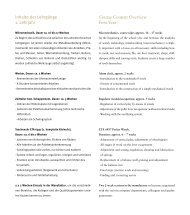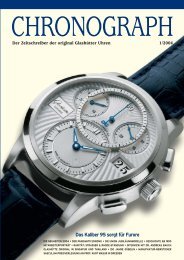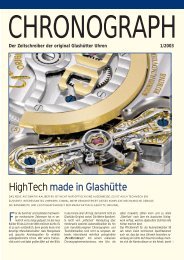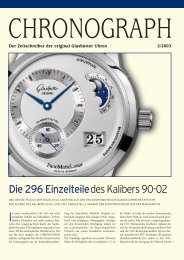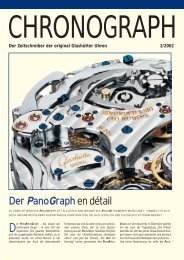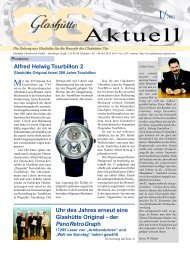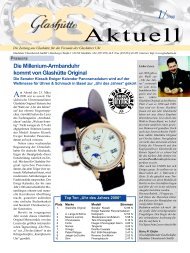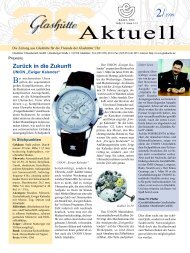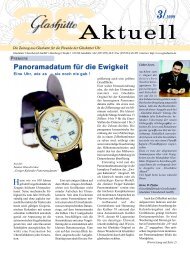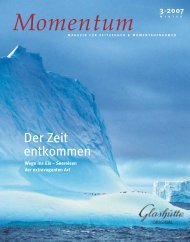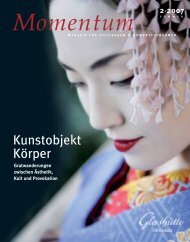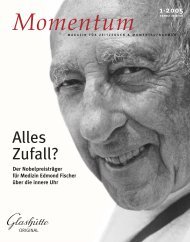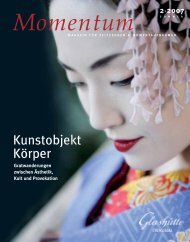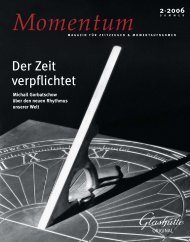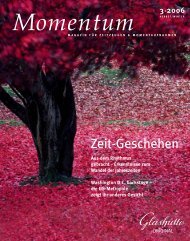2009 Momentum - Glashütte Original
2009 Momentum - Glashütte Original
2009 Momentum - Glashütte Original
Create successful ePaper yourself
Turn your PDF publications into a flip-book with our unique Google optimized e-Paper software.
12 <strong>Momentum</strong> 1· <strong>2009</strong><br />
Icon Franz Josef Radermacher<br />
Information<br />
Franz Josef Radermacher was born on 20 March 1950 in<br />
Aachen, Germany. He received a doctorate in mathematics from RWTH<br />
Aachen University in 1974 and a doctorate in economics from Universität<br />
Karlsruhe (TH). He concluded his postdoctoral research in<br />
mathematics at RWTH Aachen University in 1982. Today he is the<br />
head of the Forschungsinstitut für anwendungsorientierte Wissensverarbeitung<br />
at the University of Ulm, where he is also professor<br />
of databases and artificial intelligence. He is a member of the Club<br />
of Rome and president of the Federal Association for Economic<br />
Development and Foreign Trade (BWA). In 1993 he helped found the<br />
Global Marshall Plan Initiative. His most recent book addresses<br />
the topic of human survival in the 21st century and is called<br />
“Welt mit Zukunft – Überleben im 21. Jahrhundert”. Franz Josef<br />
Radermacher is married and has one grown-up son.<br />
------------------<br />
The Club of Rome is a think tank founded by Aurelio Peccei<br />
and Alexander King in 1968 with the aim of promoting efforts to<br />
make our future sustainable and worth living. The Rome-based<br />
organization counts representatives from the worlds of science,<br />
culture, economics and politics among its members. Its central focus<br />
today is on sustainable development; it is calling upon the people<br />
of the world to change their consumption behaviour so that their<br />
needs and the needs of generations to come can be met by the<br />
limited supply of global resources. The Club of Rome thinks and acts<br />
globally and is opposed to monocausal and short-term thinking.<br />
It aims to persuade as many people as possible to live their lives in<br />
a more sustainable way. The club has 32 national associations, 22<br />
of which are in Europe. Each one is committed to realizing these<br />
objectives. In 1972 the Club of Rome published its influential report<br />
“Limits to Growth”, which provoked a furore around the world. Since<br />
then it has regularly produced reports on the global situation.<br />
------------------<br />
The Global Marshall Plan was first devised by Al Gore in<br />
his book “Earth in the Balance”. In 2003 representatives of 19 civil<br />
society organizations came together in Frankfurt am Main to found<br />
the Global Marshall Plan Initiative. Its goals are to end poverty, raise<br />
environmental awareness and ensure its efficient implementation,<br />
and to promote health, justice and equality across the globe. In short,<br />
it aims to establish a global market economy based on ecosocial<br />
principles. The Global Marshall Plan Foundation has its headquarters<br />
in Hamburg. It is currently coordinating four main projects: The Global<br />
Contract Foundation (global-contract.org), which aims to establish<br />
international framework conditions that guarantee that the world<br />
economy functions for the collective good; The Global Marshall Plan<br />
(globalmarshallplan.org), which promotes a global market economy<br />
based on ecosocial principles; Global Commons (globalcommons.org),<br />
a virtual community for the exchange of views on global topics;<br />
and Plant for the Planet (plant-for-the-planet.org), where young<br />
people get together to plant trees and fight climate change.<br />
we organize our society; from democracy to the distribution of<br />
power, from the constitutional court of law to the public referendum,<br />
from laws that regulate the authority of governments to laws that<br />
limit the power of the police, we have learned so much and made it<br />
work in our favour. One thing that represents an obvious challenge<br />
is the astonishing speed at which the global population continues<br />
to grow and technology continues to develop. These two things<br />
make the future very new territory, because these conditions have<br />
simply never existed before. This makes our experience less<br />
authoritative. As a result, we will not only need to learn new things,<br />
we will have to unlearn some of what we already know. We will<br />
have to search for solutions while retaining our experience as a<br />
valuable point of reference. At the same time, we will need to do<br />
our best to understand the new things we encounter. That is what<br />
makes the situation so difficult.<br />
Do you think human beings have always faced unusual and unprecedented<br />
challenges or have some periods in human history been<br />
tougher than others? And what about the present day?<br />
Without a doubt, human beings have always faced unusual and<br />
unprecedented challenges. Some eras are, of course, objectively<br />
easier than others. The last 10,000 years or so have been special<br />
in that conditions have been changing systematically and rapidly,<br />
as I said – in some cases extraordinarily rapidly – especially with<br />
regard to our organizational abilities and our increasing population.<br />
A typical feature of this era is that there are too many people who<br />
want more than the world can actually give. But the size of the<br />
population has kept changing over the course of history, as have<br />
people’s desires and abilities. So we are always dealing with new<br />
issues, and our knowledge about what happened in the past, which<br />
we use to deal with these new issues, is constantly improving.<br />
Do you have a motto that reflects your views on time?<br />
My life has been characterized by a lack of time and a preoccupation<br />
with the future. Einstein once said that he spent a great<br />
deal of time thinking about the future because that is where he<br />
would be spending the rest of his life. I feel the same way.<br />
Another important thing I have learned is that time heals wounds,<br />
but that wounds also need time to heal. My motto could well be:<br />
“Time is the final resource”.



